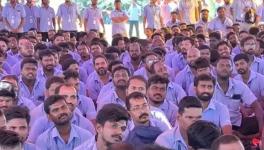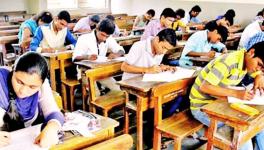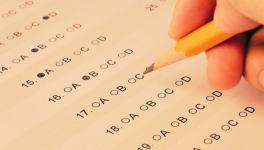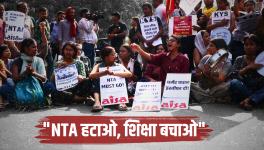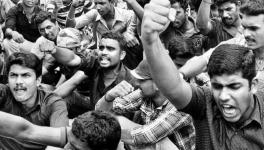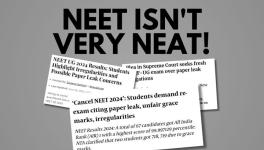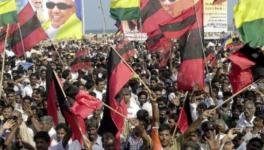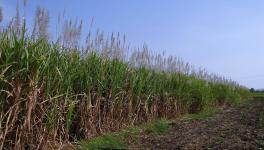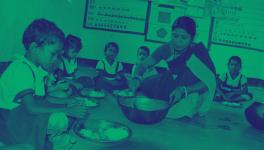NEET Might Take Tamil Nadu to Pre-Independence Days, Says Committee
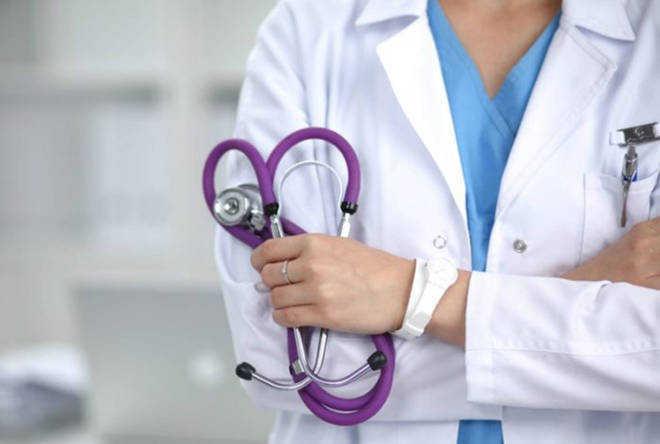
Image Courtesy: Tribune India
A detailed examination of the report of the Justice (retired) AK Rajan committee on the impact of the National Eligibility cum Entrance Test (NEET) on medical admissions in Tamil Nadu by Newsclick has found that the pre-medical entrance test is stacked against the socially and economically backward sections.
Students from rural areas and poor economic background and those educated in government Tamil-medium schools have been the worst affected after the introduction of NEET, the reports has found. The committee was set up by the Tamil Nadu government to study the impact of NEET on students in the state.
The percentage of government Tamil-medium school students taking admission to medical courses has reduced while those from the high-income group, educated at Central Board of School Education (CBSE) schools and in urban areas are enrolling more on MBBS colleges.
The committee also fears an impact on the health care system with the graduates from affluent sections preferring to work in the corporate sector, which will send the state “to pre-Independence days, where in small towns and in villages only bare-foot doctors were catering for the needs were available”. The committee criticised the commercialisation of the medical entrance coaching as another reason for the adverse impact of NEET.
TAMIL MEDIUM AND STATE BOARD STUDENTS LOSING FIGHT
The biggest losers are the students with Tamil as their medium of instruction. From 17.84% before the introduction of NEET, the intake of Tamil-medium students has plunged to 2.14%. Even though the government schools have both English and Tamil as the mediums of education, the introduction of NEET has affected the latter adversely.
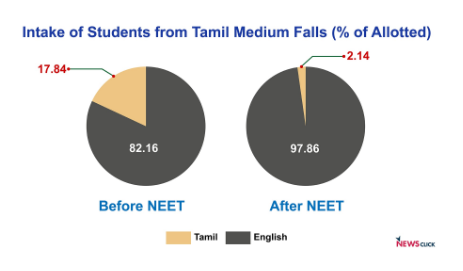
Same is the status of students in state board schools. The students educated in CBSE board schools have started to fare better in the last three years. From 99.32% before NEET, the share of HSC students has fallen to 65.7%, while the share of CBSE students has increased to 31.9% from 0.35%.
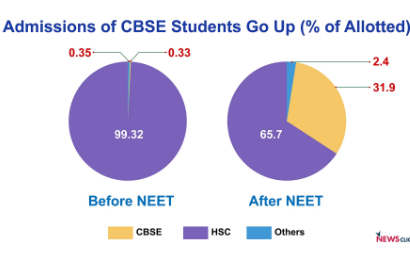
“This shows that the introduction of NEET as the sole criterion for admission to medical colleges has adversely affected the share of seats which were historically enjoyed by the TNSBSE (Tamil Nadu State Board of Secondary Education) students. But it worked positively for the CBSE and other Board students probably because of NEET’s inclination towards the CBSE syllabus,” the report stated.
ADVANTAGE FOR URBAN AND HIGHER INCOME CATEGORY
One of the main objectives of the committee was to study the adverse impacts of NEET-based admission process on the students belonging to rural and urban poor sections. Political parties also have pointed out the disparity the NEET has brought into this category, which was also identified by the committee.
Rural students have lost out their share to their urban counterparts post-NEET. The share of rural students has reduced by around 10%. Unable to compete in the CBSE-based entrance exam, the applicants of students from rural areas have also shown a downward trend from 58.45% in 2016-17 to 47.53% in 2020-21.
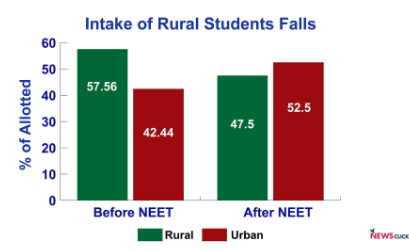
Students whose parents earn lower than Rs 2.5 lakh per annum are also facing difficulty in getting admission to medical courses. The committee has studied the income of the parents in government and government-aided schools and their share of admission in medical colleges.
Around 80% of the parents whose children are enrolled with government schools earn less than Rs 50,000 per annum while 93% of parents educating their child in government-aided schools earn less than Rs 1 lakh per annum. This clearly shows that parents who earn more to coach their children to take the entrance test secure admission for them to colleges while those with lower income are losing out
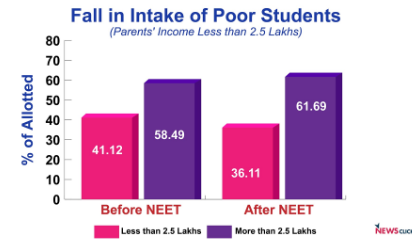
Districts with high human development index have shown stability or increase in the number of students getting admission to MBBS courses.
REDUCTION IN FIRST-GENERATION GRADUATES
Students with less academic proficiency are losing out. The report has found that the average fall in the admission of first graduate students in medical colleges after 2017-18 stands at 9.74% based on the data of the directorate of medical education (DME). Of the total students who secured admission in 2019-20, 99% students had received prior training or coaching before they appeared in the NEET, the report has found.
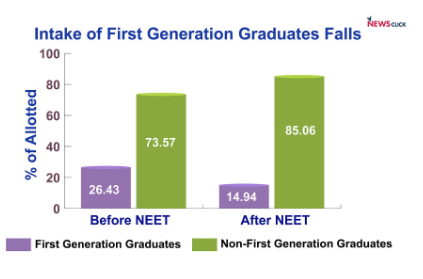
The rate of application from first graduate students has also reduced post-NEET, reflecting the percentage of admission in both government and self-financed medical colleges.
CATEGORY-WISE FALL
All the four main categories, medium of instruction, geographical location, parental income and first-generation graduates, have shown a huge fall. The admission of Tamil-medium students has fallen by 12.58% while the share of rural students has reduced by 12.1%.
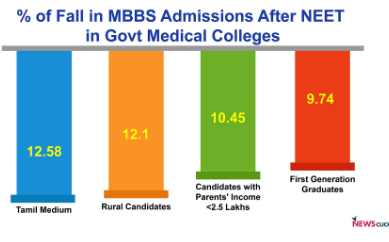
“If the diverse representation of different disadvantaged segments, like rural, low-parental income and Tamil-medium students, who constitute a major portion of society, in MBBS admission declines, over a period of time, the public health care system will get a jolt due to shortage of health care manpower,” the report stated.
Based on its findings, the report said that the students belonging of the affluent segment, who occupy the majority of the medical seats, would prefer working in the urban corporate sector, leaving the poor with very little health care facility. “There may not be enough expert doctors for being employed in the government hospitals. Further the rural and urban poor may not be able to join the medical courses. Ultimately, Tamil Nadu may go back to pre-Independence days, where in small towns and in villages only bare-foot doctors were catering for the needs were available. Tamil Nadu as a state would go down in the rank among states in the medical and health care system,” the report concluded.
(Graphics: Prakash R)
Get the latest reports & analysis with people's perspective on Protests, movements & deep analytical videos, discussions of the current affairs in your Telegram app. Subscribe to NewsClick's Telegram channel & get Real-Time updates on stories, as they get published on our website.









